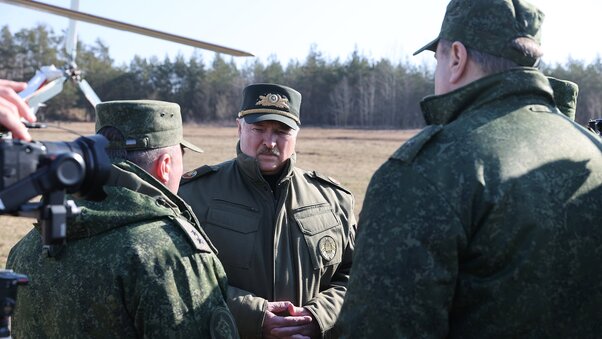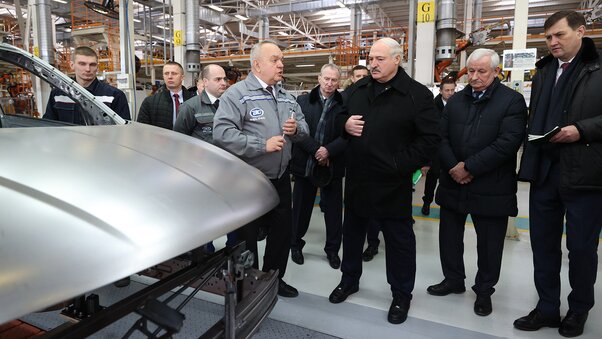Working trip to Grodno
- 31
- 2
Belarusian President Aleksandr Lukashenko was in Grodno on a working trip on 2 April.
The president began his working trip to Grodno with a question to Aide to the President - Inspector for Grodno Oblast Yuri Karayev: “Have you had fieldstones removed?”
“A lot of them. We have removed 60%,” he answered.
“What about the remaining 40%?” the head of state asked.
The president was assured that this work was underway. The necessary forces were mobilized, including from educational institutions and industrial enterprises.
Aleksandr Lukashenko had raised the problem of uncollected fieldstones a week earlier during his working trip to Oshmyany District, Grodno Oblast. Unremoved fieldstones can damage machines during harvesting.
“If a rock gets into a combine harvester, the harvester will break down. It amounts to half a million dollars,” the president noted.
Besides, the head of state heard a report by Healthcare Minister Aleksandr Khodzhayev.
“We need to make sure that our healthcare is people’s healthcare, as we used to say. It should be accessible and affordable to everyone equally,” the president said setting the task for the minister.
The head of state asked the minister whether he already got his feet under the table in his new job, whether he faced any problems, and how personnel issues were being addressed.
Aleksandr Khodzhayev responded that the instructions of the head of state are being fulfilled, including on prices and personnel.
“Is Vladimir Stepanovich [Grodno Oblast Governor and former Healthcare Minister Vladimir Karanik] involved or is he an onlooker?” asked Aleksandr Lukashenko.
“He helps, we regularly get in touch to deal with the issues that arise. We have built such working relationship that I feel free to approach him for advice,” assured Aleksandr Khodzhayev.
The head of state asked whether the Healthcare Ministry is well-staffed and whether personnel issues need to be resolved.
The minister noted that candidates for vacant positions will soon be named.
“If you don’t go with the flow, but, like Karanik, stick to your course, the situation in the healthcare will be all right. I have said before that there are plenty of clans in the healthcare sector, they like to “swim” the way they please, to serve people in higher positions. It is necessary to bring things to rights,” the head of state demanded.
Aleksandr Lukashenko also touched upon personnel issues in the healthcare sector as a whole: “They say there is not enough of this, not enough of that. Doctors, nurses... Listen, we have no shortages. Yet, in our country some people, including doctors, want to work the way they do in our country, but to live like in the West and get big money. They [in the West] work around the clock, especially young people. I know this for sure. They work day and night. And they earn accordingly.”
At the same time, the head of state noted that doctors working at Belarus’ best clinics earn very decent money.
Moreover, the government has previously provided significant financial support to doctors. “What I had promised. They were paid extra during the pandemic. I told them that I would not cancel these bonuses. And I did not. The doctors wouldn’t believe that they would keep their bonuses. But we delivered on our promise. Yet, they also need to put in more effort. A wonderful profession, a wonderful job. Probably, better than any other career in the world. Of course, it comes with responsibility and requires hard work. Recalibrate your work and do your job properly,” said Aleksandr Lukashenko.
Vladimir Karanik remarked that the financial support requested by the president for doctors was even bigger than what the Healthcare Ministry asked for.
“Few people remember now, but I remember well that our proposals for financial incentives during the pandemic were increased several times by your decision. We didn’t even ask for that much,” he said.
It should also be kept in mind that in many Western countries people pay higher taxes, while education and healthcare are not free there. “Do you want this? If you do, fine. If you want it, Karanik and I will introduce a Polish, European healthcare system in Grodno Oblast by the end of the year,” the president suggested. “Then you will pay your way. And you will see how many people will become homeless, how many will die. You will be getting healthcare services as long as you will be able to pay for them; if you have no money, you will be denied treatment.”
The head of state emphasized that such principles and such policies are currently unacceptable for Belarus. “We have a welfare state,” he stated. “We are gradually moving in this direction: if you earn money, it’s good, if you don’t, why should you live at someone else’s expense? But this will not happen overnight. A century will pass before this principle is introduced.”
Wrapping up the topic of earnings, the president reiterated that it was decided to retain bonuses for healthcare workers once the pandemic was over. “But time has passed, this has been forgotten. Many would say: there are not enough doctors, nurses and the salary is somehow too low,” the president noted. In this regard, the head of state put forward a solution that will work not only for healthcare institutions, but also for other organizations on the government payroll, for example, district and city executive committees. Their salary fund will depend on staff numbers. Thus, if there are fewer people on the staff, the remaining financial resources can be redistributed among those who work, for example, double shifts.
The head of state was briefed on the social and economic development of Grodno Oblast. Governor Vladimir Karanik emphasized that the region met all social welfare obligations. Wages grew 18% in 2023 (this growth exceeded 19% in January-February 2024). The growth of gross regional product almost reached 8%. “Further development of the region is impossible without investment, that is why Grodno Oblast is implementing 114 projects,” the governor said. According to him, 21 projects have been approved within the the president's “One District, One Project” instruction. They are all in different stages of implementation. The region continues the construction and modernization of many social facilities, including schools and an oncology clinic.
At the construction site of the future healthcare facility the head of state was briefed on the progress of the project. In particular, the discussion touched upon the plans regarding the building of hospital No.2, which is outdated, does not meet modern requirements and will be vacated after the completion and commissioning of the new building of the municipal hospital on Yanka Kupala Avenue. The building housed a monastery once and is of historical and cultural value. Aleksandr Lukashenko suggested thinking about how it can be used in the future. One of the possible options is to open a hotel or other tourist facility there.
The president was also interested in the deadline set for the construction of a new hospital. The construction was planned to take about 50 months. “This is too long,” the head of state said. Perhaps the project needs to be simplified in order to be implemented within a shorter period of time, Aleksandr Lukashenko said.
According to Vladimir Karanik, the new hospital was designed without any extravagance, but taking into account the working experience gained during the pandemic. The hospital will feature four wings, which would be possible to zone if necessary. “Great. We need to build it within two years,” the president said.


